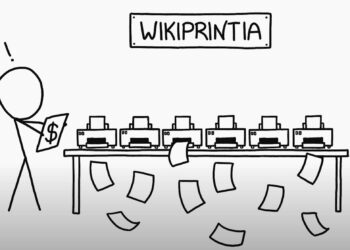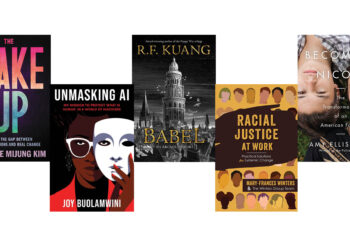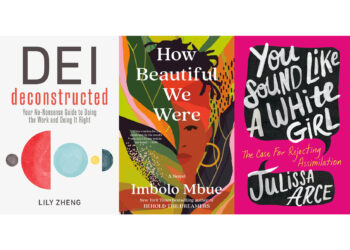
- Image via CrunchBase, source unknown
Is the emergence of YouTube changing us from a textual culture to a visual culture? If so, what might it portend for scholarship? A number of observations indicate that we need to think about this.
Alex Iskold of ReadWriteWeb recently reported on a session at the November Web 2.0 conference. After some interviews and additional observations, he concludes that YouTube is becoming the next Google.
Mary Meeker from Morgan Stanley pointed out at the same conference that YouTube is now the #2 search engine in the world.
Iskold writes:
Because video was not possible before, the web was dominated by text. Now that video cameras and broadband are cheap, information that is better served by video is getting converted. As a result, YouTube is now the second largest search engine, and traffic is through the roof.
YouTube is gaining on Google’s traffic for search (luckily for Google, it owns YouTube).
Michael Bhaskar from thedigitalist.net wonders about the possibility of a video generation, and what this might mean for literacy, capacity for critical thinking, mental efficiency, and culture overall. Referring to Maryanne Wolf’s excellent “Proust & the Squid,” he worries:
. . . we are evolving out of a text based culture. Sure there will always be a place for the economy and density of text. This place could get ever smaller though. The early days of the internet might come to be viewed as a golden age for text, a time when web sites and blogs poured forth a profusion of words such as the world had never seen, a textual Eden before the video Fall.
Even Bhaskar feels this is a little too dramatic. What Iskold observes is, I think, the truth — what is best shown can now be shown. The efficiency and mental habits of words, language, and reading will continue to have a place. What the shifting of that place into a new — even subordinate — role might mean for mental acuity and scholarship remains to be seen.
Since Albrecht Durer and his contemporaries, we’ve been supplementing a broadly textual culture with images. Then those images were given the illusion of motion. Now, these moving images can network.
Will this change the way we think? Will this change cultures?
Yes, but if history is any guide, more information — even visual information — will, on balance, be better. Scholars can use the new medium to teach, to show, and to communicate. That’s why networked video is so popular already. It helps.
Discussion
4 Thoughts on "Does YouTube Threaten Text?"
In some ways Kent, I think this is an adjustment and adjustments tend to swing hard in one direction before finding balance (which I do not mean to imply will be 50/50).
We have been so textually oriented because that was the method of communication that was easiest to create and share given the constraints of the time. Now, images and video are getting easier and easier to create & share.
Radio didn’t kill print and television didn’t kill radio, but each added to the mix of communication and entertainment possibilities – no longer allowing there to be only one game in town.
I think video will take and keep a prominent place for quite some time – just because of economy == as they say a picture is worth a thousand words. Wonder what a video’s worth!
One interesting example Ann give is the one about how new media (radio, television) didn’t kill any prior media. Yet, media deaths do occur (kinescope, player pianos, UHF television). Also, each prior form (radio, television) was about a change in broadcast capability and medium. Now, we have read:write fusing for the first time, and search disrupting programmatic approaches, which old media depended upon. I think the emergence of YouTube as a search format suggests that something more than a change in broadcast is going on. But we’ll see!
Back about a hundred years ago in the early 1990s when I was a graduate student and postdoc in biology my favorite part of each work week was the weekly departmental seminar. We’d have someone from a different research center come and give a 40-50 minute talk about their latest research and there was some mostly self-serving question and answer time at the end.
The topics of these seminars were varied and frequently pretty far afield from my research as you would expect in any reasonably diverse department but there were frequently ideas, techniques, and approaches that I could reasonably see applied to my own work. Even better, it was a great way to keep current on the research in other fields without actually going to read the articles in those areas. It would take me much more than an hour to properly read and interpret each of those topics if I was reading it in a journal.
The funny thing about those seminars was that we would usually see the same results as had been presented in the seminar show up in print 6 months or a year after we had already heard about them in a seminar or at a annual society meeting. And everyone would say “oh yeah, that’s the stuff they were showing off last spring, looks like they finally got around to publishing it”.
I’m wondering if the gradual acceptance of video as a well-distributed, archived, searchable, and reference-able format will lead to a shift away from considering text publication as the primary method of research dissemination. I could easily see a library of these short seminars as the single biggest hotspot for students and researchers. Will the rise of institutional repositories lead to an institutional repository of departmental seminars in which each member of the department gives a 20-30 minute presentation of their latest research to be posted online for all the world to see? Or perhaps funding agencies that are now requiring manuscripts be deposited in searchable databases will instead require grantees to prepare video presentations to show progress.
It would be a fantastic way to advance research and at the same time a horrendous change to the way academic research is conducted today.
![Reblog this post [with Zemanta]](http://img.zemanta.com/reblog_e.png?x-id=f4dda4ab-b0e8-4481-9916-b90c862cd7c1)


